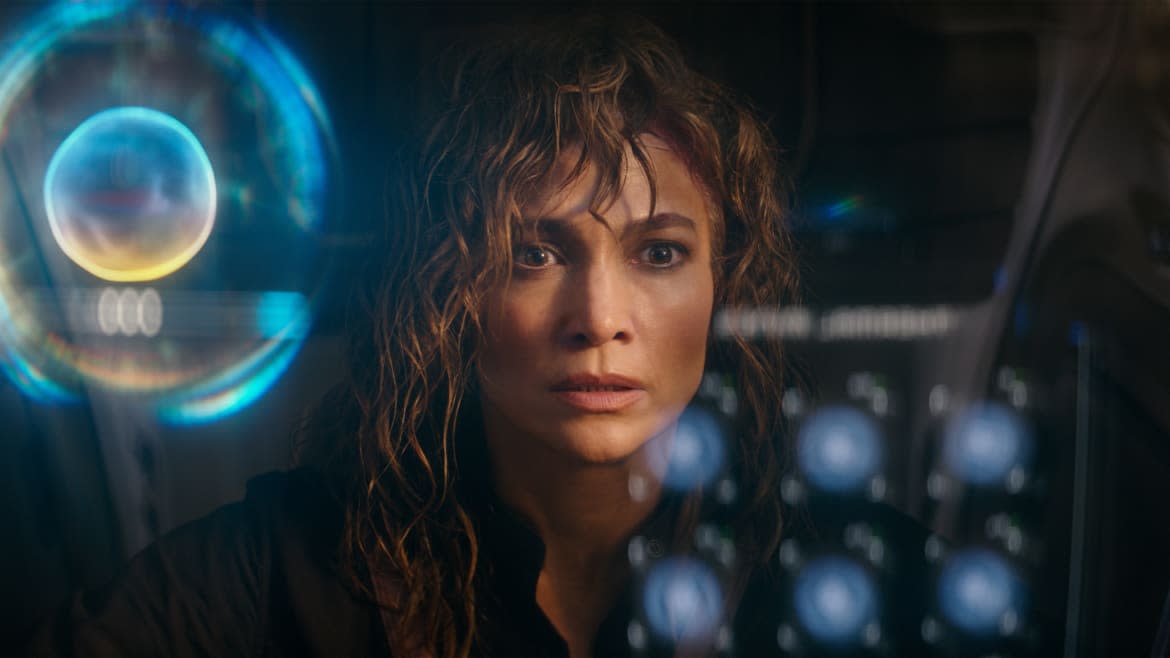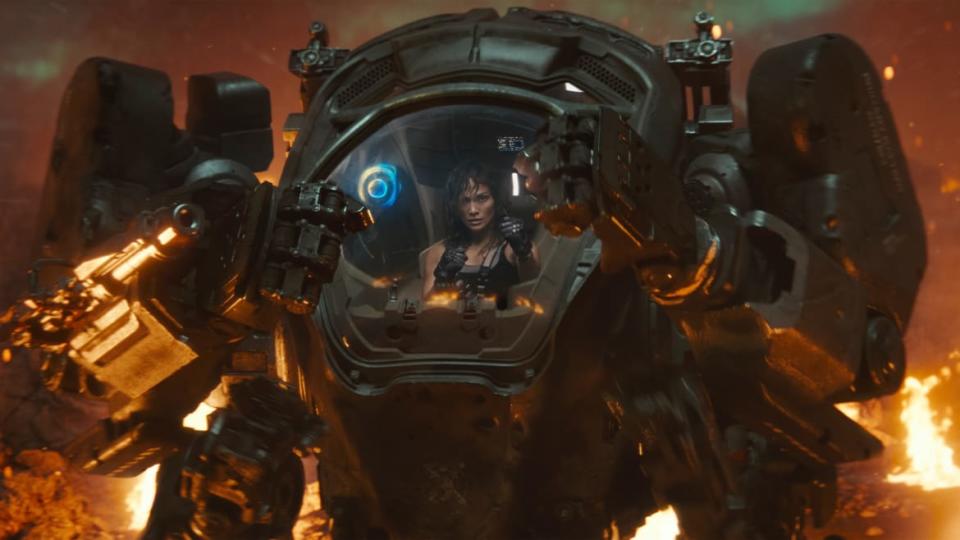J. Lo’s AI Sci-Fi Flick Is One of the Year’s Biggest Misfires

As a creative, I am constantly worrying myself with questions about artificial intelligence. Will my job be obsolete one day? Can AI as we know it ever be regulated in a way that serves both forward-thinking developers and artists? Will AI develop a voice singular and humorous enough to replace a gorgeous young entertainment critic who has stunning features that stop cars on the street and send rubbernecking cyclists smashing into trees? The answers are out there, and no one is more qualified than Jennifer Lopez to pursue them.
Excuse me, did I say Jennifer Lopez? I meant counterterrorism analyst Atlas Shepherd, the titular character in Lopez’s latest film, Atlas, which premieres on Netflix May 24. In the film—directed by the auteur behind the 2010 surrealist masterwork Cats & Dogs: The Revenge of Kitty Galore, Brad Peyton—Lopez plays a government employee with a deep distrust of artificial intelligence. Atlas toils away evaluating data to assess whether or not an invasion of AI bots, led by their commander Harlan (Simu Liu), is likely. After an uprising 28 years earlier led to a devastating war between humans and bots, Harlan fled Earth to forge an AI-led spacy colony, but not before promising to return to finish what he started.
J.Lo’s Career Identity Crisis Needs a New ‘Monster-in-Law’
Genocide and AI are two extremely pertinent, complex topics that should be addressed with intense consideration, so as not to alienate the people entrenched in their real-life dangers every day. Unfortunately, Atlas has a graceless approach to both, opting to ladle a heaping helping of CGI slop over a thinly written, myopic plot. The film is a nonsensical, emotionless dreck that can’t conjure a compelling character to save its dwindling life. Even Lopez, who typically livens even the worst material, can’t use the giant, inelegant robot she pilots to save this movie, let alone keep Earth safe from its AI invaders. Atlas is easily one of the year’s biggest trainwrecks, and—even worse—the movie’s flaccid stance on AI is more aggravating than if its filmmakers had simply taken a narrative risk and just gotten it wrong. Having the guts to try would be respectable, but the only bravery you’ll find here is the nerve it’ll take you to make it to the end credits.
In a futuristic version of Los Angeles, where the Hollywood sign has been torn down and replaced with a hotel in the same iconic shape—the movie’s first and last bit of unique world-building—Atlas works diligently to monitor the activity of Harlan and his team of AI rebels. As part of her work, Atlas interrogates captured AI insurgents, left behind to act as spies among humans and feed the information back to their commander. When one of these rebels inadvertently lets Atlas in on Harlan’s extraterrestrial hideout, a planet called GR-39, she’s roped into an attack mission that she wants no part of.
Unlike everyone else in this version of our world, Atlas is AI-averse. The closest she’ll get to using hyper-intelligent technology to do her bidding is when she barks into the ether, “QUAD AMERICANO!” which lets a nearby coffee machine make her order. (This happens enough times in the film that it bears repeating.) So, she’s understandably reluctant when Colonel Elias Banks (Sterling K. Brown) insists that Atlas come along on their mission to provide expert knowledge on Harlan’s moves. After all, Atlas and Harlan share a history: He was the first AI bot Atlas’ mother, a brilliant engineer, built. But a mysterious incident long ago left Atlas maligning the existence of AI and Harlan her whole life.

Jennifer Lopez as Atlas Shepherd.
This is all par for the course, not far from something you might see in any other movie that might get served up on a streamer’s landing page. Atlas is your standard sci-fi thriller, packed with tropes that are made even more exhausting by the fact that the movie is already so insipid. There’s the villain who won’t die, rogue AI, dystopian futures that resemble our current realities, and J.Lo wearing a dowdy wig and glasses, before later getting a blowout and contacts. (J.Lo stars as J.Li-brarian!) Atlas treats all of these banal concepts with an unearned gravity, as if they’re part of something grand, a cinematic missive on the current state of AI. Perhaps if Atlas’ screenwriters, Leo Sardarian and Aron Eli Coleite, had tried to get a handle on the concept of irony before deploying the makeover trope, Atlas could even be a clever meta-commentary on the use of AI in the entertainment industry.
But instead of weaving any thoughtful critique into the film’s subtext, Atlas grounds its assessment of artificial intelligence into a powder so fine that it’s near-translucent. Initially, the film takes a firm “AI is bad” stance. Moments later, Atlas is forced to reconcile her distrust, confronting her fears head-on when a critical mishap leaves her piloting an AI robot named Smith (voiced by Gregory James Cohan), who constantly asks Atlas to use the neural link provided to her so Smith can connect to her brain. Atlas’ mind and Smith’s technology will produce “something greater” than the both of them alone. Suddenly, the film’s position on the tech wave polarizing the world is even muddier, before being obscured entirely by a third act so predictably dopey it almost livens up the movie’s ending—almost.
How Lopez, Brown, and Liu all got suckered into this is a question as glaring as the overarching query of, “How did this get made?” Lopez is fresh off a streak of wild decisions, but even releasing a CGI-filled tribute to your cosmic love is less perplexing than signing onto Atlas. (And, for what it’s worth, This Is Me…Now: A Love Story has more convincingly rendered effects.) But Lopez brings her usual charisma and passion to the role, making even the schlockiest of movies watchable. Liu, however, ironically delivers all of his lines like a collection of supervillain catchphrases fed to an AI program with his voice.
And though you may see people quip that Atlas’ script also seems like it was written by AI, the reality is so much darker. Besides that joke being overused, it’s also untrue. At least AI programs like ChatGPT make enough dumb mistakes to chalk their faults up to machine error. But Atlas is a movie made by humans, ones who thought they had a good enough idea to pour millions of dollars into its conception. In a moment when everyone is legitimately concerned about the role that AI will play in our lives going forward, creating such a limp, insecure film that deals directly with the subject, yet says absolutely nothing about it, isn’t just a waste of money. It’s a waste of valuable time.
Get the Daily Beast's biggest scoops and scandals delivered right to your inbox. Sign up now.
Stay informed and gain unlimited access to the Daily Beast's unmatched reporting. Subscribe now.


